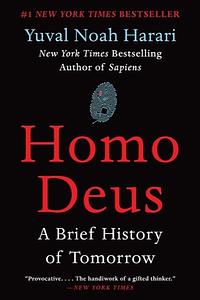You need to sign in or sign up before continuing.
Take a photo of a barcode or cover
Yuval Noah Harari is one of the greatest writers of our time. Toward the end of his book he says that he is so occupied with exchanging bits and bites of information in a society that facelessly exchanges bits and bites of information for a higher, possibly unknowable purpose, but I think we can all agree that Harari is neither faceless nor fading into the algorithm that is the global human experience.As was Sapiens, Homo Deus is easily readable and very informative. Harari is playful, intelligent, imaginative, and still grounded in a healthy realism.
Harari argues that while we as homo sapiens have worked to maximize health, happiness, and power we have also functionally brought about our own extinction. We have created a race of demi-gods (which Harari calls “Homo Deus” which will necessarily overtake our humble beginnings as just another mammal. Harari also argues that a new religion (Dataism) will soon overtake our society, which might make even those of us who upgrade to the new species of homo deus completely irrelevant.This book is a strong historical text and fascinating speculative one. While reading I couldn’t help but imagine future generations reading the text and either being floored by Harari's accuracy or delighted by his quaint inaccuracy.
Most of the time Harari is general enough that his guesses feel like they must be accurate, but every once in a while they're so specific that the reader can't help wondering what Harari is: prophet or street crier. Of course, he goes out of his way to say that the future could hold anything, but definitely asks his reader to think as boldly as he's written about what the future might hold.
Harari argues that while we as homo sapiens have worked to maximize health, happiness, and power we have also functionally brought about our own extinction. We have created a race of demi-gods (which Harari calls “Homo Deus” which will necessarily overtake our humble beginnings as just another mammal. Harari also argues that a new religion (Dataism) will soon overtake our society, which might make even those of us who upgrade to the new species of homo deus completely irrelevant.This book is a strong historical text and fascinating speculative one. While reading I couldn’t help but imagine future generations reading the text and either being floored by Harari's accuracy or delighted by his quaint inaccuracy.
Most of the time Harari is general enough that his guesses feel like they must be accurate, but every once in a while they're so specific that the reader can't help wondering what Harari is: prophet or street crier. Of course, he goes out of his way to say that the future could hold anything, but definitely asks his reader to think as boldly as he's written about what the future might hold.
I personally enjoyed Sapiens more than Homo Deus. Homo Deus is focused on how things could potentially change in the future for humans with the new technologies and changes within humanity. Definitely an interesting read, but also a lot of speculation.
informative
reflective
slow-paced
I was not over-enthusiastic about Sapiens and this book was worse. A lot of the ideas are repeated here, and there are also a lot of factual inaccuracies. Sometimes that is because with the passing of times we now know better and sometimes it is just wrong.
For instance, he writes that we have no clue why we need to experience fear (and other emotions). That is not so, there is a multitude of data on that topic. In the whole book, he ignores neurochemistry, which is one reason that the brain is much more sophisticated than the network of electrical connections that he describes.
Likewise he only partially understands the Porsolt cylinde test. It is about learned helplessness and depression. I've never met a biologist who describes living beings as algorithms (I am a biologist), so don't know where he gets that from. Biologists do make models of various processes, but that is a simplification of reality, to test understanding, not reality itself.
Nowadays we know that Neandathals most likely had very complex language, and interbred with Homo sapiens. It is not clear that their extinction was due to 'superiour' abilities of H. sapiens and indeed, seeing we all have their DNA in our genome, it is a moot point if they are extinct.
But the worst is his exaultation of big tech IT companies. He makes the mistake, that I think noone today would make, of assuming that those companies are neutral. The idea that google processes something for the common good rather than for the profit of google now looks very naïeve. Thankfully in the EU we have privacy legislation to protect us, and even in the US, legislators are waking up. His free flow of information is further away than he thinks. And autonomous cars have also not taken over, that is turning out to be a much harder problem than everyone thought 10 years ago.
As always, predicting the future is much harder than predicting the past.
For instance, he writes that we have no clue why we need to experience fear (and other emotions). That is not so, there is a multitude of data on that topic. In the whole book, he ignores neurochemistry, which is one reason that the brain is much more sophisticated than the network of electrical connections that he describes.
Likewise he only partially understands the Porsolt cylinde test. It is about learned helplessness and depression. I've never met a biologist who describes living beings as algorithms (I am a biologist), so don't know where he gets that from. Biologists do make models of various processes, but that is a simplification of reality, to test understanding, not reality itself.
Nowadays we know that Neandathals most likely had very complex language, and interbred with Homo sapiens. It is not clear that their extinction was due to 'superiour' abilities of H. sapiens and indeed, seeing we all have their DNA in our genome, it is a moot point if they are extinct.
But the worst is his exaultation of big tech IT companies. He makes the mistake, that I think noone today would make, of assuming that those companies are neutral. The idea that google processes something for the common good rather than for the profit of google now looks very naïeve. Thankfully in the EU we have privacy legislation to protect us, and even in the US, legislators are waking up. His free flow of information is further away than he thinks. And autonomous cars have also not taken over, that is turning out to be a much harder problem than everyone thought 10 years ago.
As always, predicting the future is much harder than predicting the past.
informative
fast-paced
Homo Deus reads as more speculative than its predecessor and is not quite as factual and cohesive as Sapiens.
The text was interesting and engaging and it opened my eyes, making me think about modern society and current trends. For this, Homo Deus is certainly a book worth reading and recommending.
With that said, the only aspect that I did not enjoy in Sapiens is very much highlighted in its Homo Deus, unfortunately. Harari constantly oversimplifies circumstances and facts to fit his narrative and opinion and although I don't think this is due to intellectual dishonesty, it makes for a more stale and shallow thought experience.
The text was interesting and engaging and it opened my eyes, making me think about modern society and current trends. For this, Homo Deus is certainly a book worth reading and recommending.
With that said, the only aspect that I did not enjoy in Sapiens is very much highlighted in its Homo Deus, unfortunately. Harari constantly oversimplifies circumstances and facts to fit his narrative and opinion and although I don't think this is due to intellectual dishonesty, it makes for a more stale and shallow thought experience.
challenging
informative
inspiring
tense
slow-paced
I didn't like this book as much as I liked his other two books. It was a bit random and outdated.
Scarier than a Black Mirror episode...
Before reading this book I had a simple view on my own mortality: I do not regret living today except that I regret not knowing what is to come after me. The wondrous achievements in science and technology of future generations will forever be a mystery to me, and that was my greatest sorrow. However, Homo Deus convinced me of the complete opposite - I do not want to witness future. I'm just fine the way I am, thank you very much. Whether it's life that is written for me by algorithms, or the reality where the rich and famous live forever, I'd rather be content with having no idea what Snapchat is.
Before reading this book I had a simple view on my own mortality: I do not regret living today except that I regret not knowing what is to come after me. The wondrous achievements in science and technology of future generations will forever be a mystery to me, and that was my greatest sorrow. However, Homo Deus convinced me of the complete opposite - I do not want to witness future. I'm just fine the way I am, thank you very much. Whether it's life that is written for me by algorithms, or the reality where the rich and famous live forever, I'd rather be content with having no idea what Snapchat is.
challenging
informative
sad
slow-paced
I'm not a big non-fiction reader, but I did enjoy 'Sapiens'.
Unfortunately 'Homo Deus' just didn't hold the same appeal. All very speculative and felt a bit depressing and pointless. Raised some interesting points, but not with any real resolution or sense of inspiring action.
Unfortunately 'Homo Deus' just didn't hold the same appeal. All very speculative and felt a bit depressing and pointless. Raised some interesting points, but not with any real resolution or sense of inspiring action.






